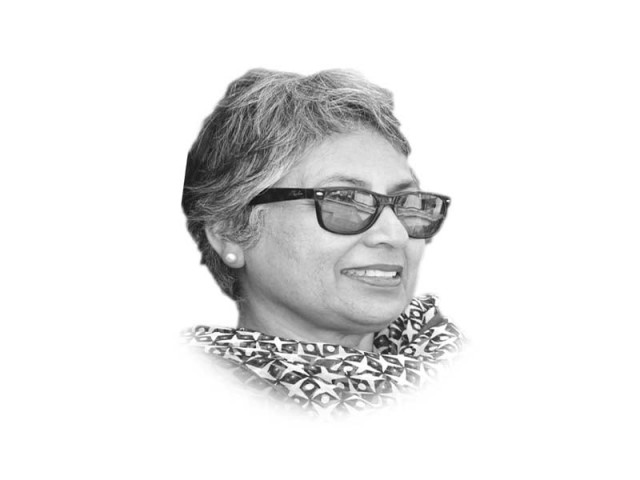Abida Hussain’s gripping memoir
Power Failure: The Political Odyssey of a Pakistani Woman is a refresher course in history of Pakistan

The writer is an academic and freelance columnist
The only child of Syed Abid Hussain, one of the biggest landlords of Punjab, and Kishwar Abid Hussain, the daughter of Syed Maratab Ali, a successful businessman from Lahore, Abida was born to privilege and endowed with the rare gifts of both beauty and brains. However, the heiress had to establish her fiat in the conservative and patriarchal society of Jhang, in southern Punjab, at the tender age of 25, when she prematurely lost her father to cancer. Syed Fakhar Imam, a first cousin, was already her life partner when she inherited her father’s mantle. A landed magnate in his own right, Fakhar has been the quiet sheet anchor in her challenging journey.
Since she interacted closely with nearly all the major political actors, and knew most of them personally, it lends her narrative a sense of immediacy. Known for being opinionated, Abida’s book is dispassionate, allowing the reader to draw his or her own conclusions. Almost like a film noir, five decades of Pakistan history unfolds under her pen at a good pace, dotted with anecdotes and impressions about the people who played a role in shaping the country.

Early in her political career she was a member of Prime Minister Zulfikar Ali Bhutto’s delegation, where she encountered Benazir Bhutto, then a gauche young student. Many decades later, when Pervez Musharraf was in power and Benazir was in exile, this flowered into a friendship and deep bonding, and Abida joined the Pakistan Peoples Party (PPP). The closeness of the two is apparent in the uncritical warmth with which Abida writes about her, while the National Reconciliatin Ordinance (NRO) gets short shrift. One conversation between the two ladies is reflective of their closeness, when Benazir asks her whether she has ever had suspicions about Fakhar’s fidelity, and Abida replies in the negative. Benazir ruefully confesses that she has not been so lucky with Asif, but forgives him because of her love for him. The Greek tragedy that afflicts the Bhuttos reached its climax when Benazir was killed in Rawalpindi. In just over a year, Abida had lost two friends, Akbar Bugti and Benazir, and their assassinations cast a long shadow over Musharraf’s government. She poignantly declares that the effect of Benazir’s death on her family: “we were politically wrecked”.
Ziaul Haq looms large in the narrative as he initiates his rule with, what is commonly regarded as the judicial murder of Zufikar Ali Bhutto. The narrative acquires a sharp edge, as the effects of his policies become apparent. She describes how Zia’s isolation as an “international pariah” was short-lived, as Pakistan became an ally of the Americans in the Afghan jihad against the Soviets. Pakistan was transformed as millions of Afghan refugees poured in, and was awash with drugs and weapons, and an intolerant and violent ideology began to permeate society. The effect on Jhang, her home and political base, was disastrous. By the late 1980s, militant groups were spreading sectarian hatred in Jhang, and when their leader was killed in early 1990, they went on a killing and burning spree. Since then, she has faced threats to her life with admirable sangfroid, while successive administrations have been silent bystanders at best, and have even used these groups for political expediency in elections.
She discusses the rough and tumble of constituency politics, becoming the first woman chairperson of the district council, and later the first woman to be elected to the National Assembly from a general seat. There is a blow-by-blow account of how the husband and wife team, and its allies, gave spirited opposition to Zia’s legislation after the non-party polls in the National Assembly that cost Fakhar his chair as the speaker of the National Assembly.
Given her varied experience and reputation as a strong nationalist, President Ghulam Ishaq Khan was instrumental in sending her as Pakistan’s ambassador to the US during a difficult time in Pakistan-US relations. The Afghan war was over, the Americans did not need Pakistan any more, and the pressure to roll back the nuclear programme was at its peak. She has an interesting vignette about the meeting between then-army chief General Asif Nawaz and the US secretary of defence: at a meeting at the Pentagon, Dick Cheney asks to speak to Asif Nawaz alone, and tells him that Nawaz Sharif is not indispensable as prime minister, and the US would support a military takeover if they roll back the nuclear programme. Quintessential American realpolitik!
What makes Abida’s story different from the plethora of self-serving memoirs coming out of Pakistan is that she recounts the vicissitudes through which this country has passed with empathy. She is critical and pained at the irresponsibility of our decision-makers, but not judgmental, a fine difference. Running through the whole narrative is the frightening thread of how violent militants have been allowed to grow and become a menace to the state and society of Pakistan. And it is all through the eyes of a woman, who has the unprecedented task to represent her conservative rural constituency by fighting general elections, and is then catapulted to represent Pakistan in Washington, D.C. Her ability to operate effectively in a different cultural milieu has always been a cause of fascination for me, as has her facility to switch between different languages. Having conducted herself with grace and dignity at the helm of Pakistan’s affairs, she has now written a memoir that is difficult to put down.
Published in The Express Tribune, April 2nd, 2015.
Like Opinion & Editorial on Facebook, follow @ETOpEd on Twitter to receive all updates on all our daily pieces.















COMMENTS
Comments are moderated and generally will be posted if they are on-topic and not abusive.
For more information, please see our Comments FAQ